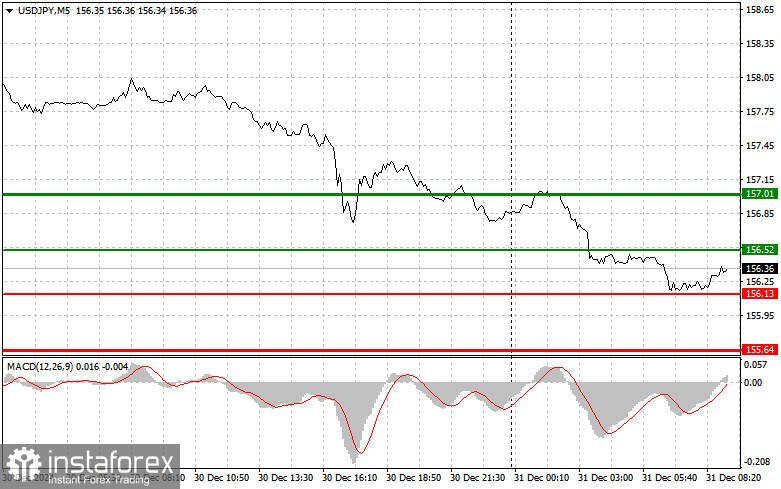Analysis of Trades and Trading Tips for the Japanese Yen
The test of the 157.52 price level occurred when the MACD indicator had moved significantly downward from the zero mark, limiting the pair's downward potential—especially in the context of the pair's upward trend. For this reason, I did not sell the dollar and missed the entire downward movement.
The year-end correction of the pair serves as an important signal, highlighting that the actions of the Bank of Japan in the coming year will remain closely monitored by traders. Therefore, it's unwise to bet heavily on the yen's weakness, as it awaits new statements from the regulator. However, the U.S. dollar, which will continue to be in demand next year, also necessitates the development of more long-term USD/JPY strengthening strategies. A neutral stance at the year-end seems most prudent, especially since traders are unlikely to make significant decisions at this time.
For intraday strategy, I will rely more on Scenario #2.

Buy Scenarios
Scenario #1: Today, I plan to buy USD/JPY upon reaching the 156.52 entry point (green line on the chart) with a target of 157.01 (thicker green line on the chart). Around 157.01, I plan to exit buy positions and open sell trades in the opposite direction (targeting a movement of 30–35 points in the opposite direction). It's best to bet on the pair's continued growth and buy on corrections. Important! Before buying, ensure the MACD indicator is above the zero mark and just starting to rise from it.
Scenario #2: I also plan to buy USD/JPY today after two consecutive tests of the 156.13 price level, provided the MACD indicator is in the oversold zone. This would limit the pair's downward potential and lead to a market reversal upward. Growth can be expected toward the opposite levels of 156.52 and 157.01.
Sell Scenarios
Scenario #1: I plan to sell USD/JPY today only after breaking below the 156.13 level (red line on the chart), which will lead to a quick decline in the pair. The key target for sellers will be 155.64, where I plan to exit sell trades and immediately open buy trades in the opposite direction (targeting a movement of 20–25 points in the opposite direction). Pressure on the pair is unlikely to return today. Important! Before selling, ensure the MACD indicator is below the zero mark and just starting to decline from it.
Scenario #2: I also plan to sell USD/JPY today after two consecutive tests of the 156.52 price level, provided the MACD indicator is in the overbought zone. This would limit the pair's upward potential and lead to a market reversal downward. Declines can be expected toward the opposite levels of 156.13 and 155.64.

What's on the chart:
- Thin Green Line: Entry price for buying the instrument.
- Thick Green Line: Estimated price for setting Take Profit orders or manually fixing profits, as further growth above this level is unlikely.
- Thin Red Line: Entry price for selling the instrument.
- Thick Red Line: Estimated price for setting Take Profit orders or manually fixing profits, as further declines below this level are unlikely.
- MACD Indicator: When entering the market, focus on overbought and oversold zones.
Important Notes
Beginner forex traders should exercise extreme caution when making market entry decisions. It is advisable to stay out of the market before the release of major fundamental reports to avoid sharp price fluctuations. If trading during news releases, always use stop-loss orders to minimize losses. Without stop-loss orders, you can quickly lose your entire deposit, especially when trading large volumes.
Remember that successful trading requires a clear trading plan, such as the one presented above. Spontaneous trading decisions based on current market conditions are inherently a losing strategy for intraday traders.
 English
English 
 Русский
Русский Bahasa Indonesia
Bahasa Indonesia Bahasa Malay
Bahasa Malay ไทย
ไทย Español
Español Deutsch
Deutsch Български
Български Français
Français Tiếng Việt
Tiếng Việt 中文
中文 বাংলা
বাংলা हिन्दी
हिन्दी Čeština
Čeština Українська
Українська Română
Română

